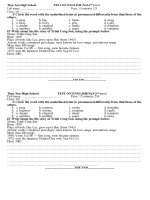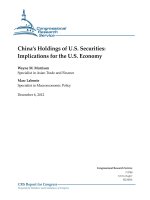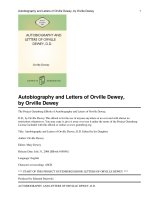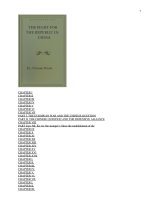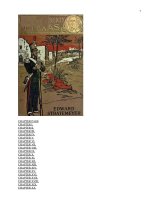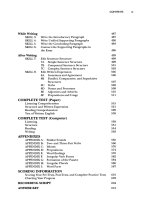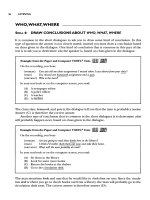TEST 2 - FOR THE UNIVERSITY ENTRANCE EXAMINATION pptx
Bạn đang xem bản rút gọn của tài liệu. Xem và tải ngay bản đầy đủ của tài liệu tại đây (122.84 KB, 7 trang )
TEST FOR THE UNIVERSITY ENTRANCE EXAMINATION 2
Pronunciation
1. A. bury B. cleanliness ['klenlinis] C. plenty
D. dean
2. A. challenge B. chameleon [kə'mi:ljən] tắc kè hoa C. chewing D.
chapter
3. A. blow B. tomb [tu:m] C. sew D. dove
1. A. double B. plough C. tough
D. couple
2. A. nose B. please C. toes D. taps
Choose the word whose stress is on the first syllable.
6. A. definite B. belonging C. organic D. alternative
7. A. challenging B. impervious [im'pə:vjəs] không tiếp thu được, trơ trơ C. acceptable D.
advisable
8. A. activity B. introduce C. supervisor ['su:pəvaizə] D.
approximately
9. A. compound B. triangle ['traiæηgl] C. advanced D. pajamas
[pə'dʒa:məz]
10. A. agricultural [,ægri'kʌlt∫ərəl] B. propose [prə'pouz] đề nghị, đề xuất, đưa ra
C. opponent D. conquer ['kɔηkə]
Choose the right word or phrase to complete the sentences.
11. The teacher asked us________ the essay we________ the day before.
A. to rewrite/ handed B. rewriting / have handed C. to rewrite / had handed D. rewriting / had
handed
12. "Have you________ traveled to San Francisco?" - "Yes, ________’’
A. once / once B. ever / once C. never / never D. yet / never
13. The government have tried to ________the price of petrol, but they failed.
A. bring on B. put in C. bring down D. get over
14. Sue has put her name________ the course in politics, though her major is fine arts.
A. to B. on with C. in on D.
down for
15. Never________ such a magnificent firework display.
A. have I seen before B. have before seen I C. have before I seen D.
before have I seen
16. It appears that we have________
A. no bread left B. no left bread C. left not bread D.
bread not left
17. I couldn't________ (A. make a fuss B. give way to C. make a choice D.
decide myself)
18. Despite his disappointment, he remained _______. ( A. cheer B. cheerful C. cheerfully D.
cheering)
19. The examiner asked me some further questions_________ led to a m9re interesting
discussion.
A. that B. it then C. which D. so
20. The dear waters here________ some of the world's best divers
A. draw attention B. attract C. appeal D.
provoke
21. The Golden Trident, the underwater equivalent of the Nobel Prizes, has been ____annually
since 1960.
A represented B. rewarded C. honored D.
awarded
22. A lot of people who live in the outskirts have to________ to work every day by train or tube.
A tour B. commute C. travel D.
Move
23. Ann was surprised________ her family's reaction________her decision.
A at I to B. by I at C. at I for D. with
I to
24. We, the local residents were asked to________ for the best activist of the local council.
A elect B. shortlist C. support D. vote
25. Van Gogh's Sunflowers _________39.9 million dollars, three times the previous record.
A once sold for B. for sale once C. selling for once D. for once sold
26. About 20 miles from the station__________ a little inn called Violet which looked nice
A had B. there was C. there were D.
where was
27. Total weight of all the ants in the world is much greater than__________
A all human beings B. total human beings C. that of all human beings D. those of all
human beings
28. Recent technological __________ such as the Internet are proving very useful for
conservationists.
A advances B. underachievement C. successes D.
discoveries
29. You cannot ________ me for the damage. I am not responsible for that.
A apologize B. blame C. ask D.
mistake
30. The mother is very ________ about the health of her little son.
A concerned B. confused C. nervous D.
careful
31. I will never forget _________ with Janet, who keeps _______ all the time
A working I to try B. to work Ito try C. working I trying D. to
work I trying
32. After the accident, a lot of debris _________ on the runway. ['debri:] mảnh vỡ
A. was scattered B. scatters C. were scatters D. were scattering
33. Such _______ that we all felt numb.
A. a cold weather was it B. was a cold weather C. cold was the weather D. was cold
weather
34. I ________ Katie, an old friend on the way home from the office yesterday.
A. came into B. broke into C. ran into D. went into
35. The man shouted loudly as if we _________all deaf. ( A. were B. had been C. are D.
would be)
36. They walked along the promenade________ the waves ________ at the rocks.
A. listening I rushed B. to listen I rushing C. listened I to rush D. listening I
rushing
37. These ______ sites need restoring and protecting.
A. history B. historical C. historically D. historic
38. When I told her the news, she _______ laughing. ( A. broke out B. burst out C. burst into
D. uttered)
39. When will you leave _______ London? ( A in B. at C. to
D. for)
40. Speak it again _________ I can take notes. (A. in order B. in order that C. in case
D. then)
41. _________ back to her hometown, Julia found everything new and attractive.
A. When arrived B. As she arrives C. On arriving D. On arrival
42. You ________ too much emphasis on your academic success. Be relaxed!
A. offer B. take C. give D. put
43. I have had such important decisions_________ for the last three months
A. to do B. to make C. to give D. to put
44. By the time you_________ the shopping, I'll be ready.
A. did B. will have done C. have done D. will do
45. Guess who I saw the _______ day. Our old English teacher. (A. next B. last C. very
D. other)
Choose the word or phrase which best replaces the underlined word.
46. The situation seems to be changing minute by minute.
A. from time to time B. time after time C. again and again D. very rapidly
47. I think we have solved this problem once and for all.
A. in the end B. forever C. temporarily D. for
everybody
48. I am looking for a dependable person who can stand out for me at the meeting.
A. dependent B. talented C. energetic D. reliable
49. My little boy Tom never screams though he is scared.
A. in pain B. frightened C. embarrassed D.confused
50. You can do whatever you like, as far as I am concerned.
A. mind out B. actually C. indeed D. in my
opinion
51. Sometimes when I hear the news, I feel very miserable.
A. confused B frightened C. upset D. disappointed
52. Smoking has been banned in public places in some countries.
A. made illegal B. limited C. restricted D. given way
53. I have to take up my dress. I step on it all the time,
A. make it longer B. embellish: làm đẹp C. shorten D. try on
54. The film is not worth seeing. The plot is too dull.
A. slow B. simple C. complicated D. boring
55. Maria will take charge of the advertising for the play.
A. spend time B. be responsible for C. account for D.spend money
56. Many areas in Africa are desperately short of food.
A. unfortunately B. widely C. temporarily D.
badly
57. We now can find a wide range of ready-cooked food in supermarkets.
A. variety B. classification C. small number D.
popularity
58. I sometimes give my friends a ride in my car.
A. ask my friends drive for me B. let my friends drive my car C. hitch-hike my friends D. give my
friends a lift
59. A woman had a narrow escape when the car came round the corner.
A. was hurt B. was nearly hurt C. ran away D. bumped into
the car
60. The old people in the neighborhood are constantly visiting each other.
A. rarely B. occasionally C. continuously D. quite often
Choose the sentence that is similar in meaning to the one given.
61. Without your help, I couldn't have finished it on time.
A. I couldn't finish it on time because you helped me. B. I couldn't finish it on time though
you helped me
C. I could finish it on time because you helped me. D. You helped me finishing it
on time.
62. His daydreaming prevented him from becoming a good employee.
A If he daydreamed, he would become a better employee.
B. He could become a better employee without his daydreaming.
C. He daydreams, which makes him a good employee. D. As a daydreamer, he is a
good employee.
63. The children are looking forward to having a holiday on the beach.
A. The children are considering having a holiday on the beach.
B. The children want to put off having a holiday on the beach.
C. Looking forward, the children are having a holiday on the beach.
D. The children really expect to have a holiday on the beach.
64. Ian denied stealing the confidential files.
A. Ian said that he had not stolen the confidential files. B. Ian's stealing the confidential files was
not true
C. Ian said, ' I will not steal the confidential files' D. Ian said that he would not steal the
confidential files.
65. I took Janet to the zoo so that she could see how big an elephant is.
A. With a view to see how big an elephant is, I took Janet to the zoo.
B. So as to see the elephant, I took Janet to the big zoo.
C. Because Janet was big enough, I took her to the zoo to see the elephant.
D. I took Janet to the zoo in order for her to see how big an elephant is.
66. Despite his early retirement, he found no peace in life.
A. Although he retired early, but he found no peace in life.
B. His early retirement has brought him peace in life.
C. He found no peace in life because he retired early. D. Early as he retired,,11efound no
peace in life.
67. I love walking in the rain, though it is not good for health.
A. Walking in the rain, I am not healthy. B. It is not good for health to
walk in the rain.
C. Walking in the rain is not good for health, but I love it.
D. I love walking in the rain despite of its bad effect on health.
68. 'Please do not touch that wire!' the old man said to me.
A. The old man told me not to touch that wire. B. The old man said that I didn't
touch that wire.
C. The old man asked me to not touch that wire. D. The old man said to me not to touch
that wire.
69. I remember giving you a five-pound note.
A. Whether I gave you a five-pound note or not, I can remember.
B. I can't remember whether I gave you a five-pound note or not.
C. I did gave you a five-pound note, and I could remember it.
D. j remember I have given you a five-pound note.
70. The next door neighbor is a singer and he often comes home very late at night.
A. The next door neighbor, a singer, come home very late at night.
B. As a singer, next door neighbours often come home late at night.
C. The next door neighbour who is a singer often comes home late at night.
D. The next door neighbour comes home very late at night but he is a singer.
71. She tapped her feet in time when listened to her favorite song broadcast on the radio.
72. !! was hot but we decided to walk in the shadow of the long wall.
73. Those who have never been abroad is eager to see how different the other cultures are.
74. Some of these plants are national rarity and should be well protected.
75. I couldn't give the teacher the summary of the lesson until Julia whispered some words into
his ears.
76. Believed that Jack had got home safely, we felt relieved.
77. We really enjoyed the children's imaginative and excited play last Saturday.
78. I will have you to know how bad your behaviour is
79. They promised that they would publish my article was sent in last week.
80. Helen as well as her friends have never been out of town since they were five years old.
Read the passage and choose the correct answers.
History books recorded that the first film with sound was The Jazz Singer in 1927. But
sound films, or talkies, did not suddenly appear after years of silent screenings. From the earliest
public performances in 1896, films were accompanied by music and sound effects. These were
produced by a single pianist, a small band, or a full-scale orchestra; large movie theatres could
buy sound-effect machines. Research into sound that was reproduced at exactly at the same time
as the pictures - called 'synchronized sound' – began soon after the very first films were shown.
With synchronized sound, characters on the movie screen could sing and speak. As early as 1896,
the newly invented gramophone (máy hát), which played a large disc carrying music and dialogue,
was used as a sound system. The biggest disadvantage was that the sound and pictures could
become unsynchronized if, for example, the gramophone needle jumped or if the speed of the
projector changed. This system was only effective for a single song or dialogue sequence.
In the 'sound-on-film' system, sound was recorded as a series of marks on celluloid
which could be read by an optical sensor. These signals would be placed on the film alongside
the image, guaranteeing synchronization (sự đồng bộ hoá ). Short feature films were produced in this
way as early as 1922. This system eventually brought us 'talking pictures'.
81. The passage is mainly about the
A. history of silent movies B. disadvantages of synchronized sound
C. development of sound with movies D. research into sound reproduction
82. According to the passage, films using sound effects were screened
A. before 1896 B. as early as 1896 C. as early as 1922
D. in 1927
83. The word 'screenings' in is closest in meaning to
A. projections B. revelations sự phát hiện, sự khám phá
C. demonstrations D. diversions [dai'və:∫n] sự giải trí,
sự tiêu khiển
84. Which of the following is not mentioned as a producer o! sound to accompany movies?
A. a jazz singer B. single pianist C. a small band D. a
gramophone
85. It can be inferred that
A. most movie theaters had a pianist
B. sound-effects machines were not common because they were expensive
C. orchestras couldn't synchronize sound with the pictures
D. gramophones were developed about the same time as moving pictures.
86. According to the passage, gramophones were ineffective because they
A. got out of synchronization with the picture. B. were too large for most movie
theaters.
C. were newly invented and still had imperfections D. changed speeds when the needle
jumped.
87. The word 'sequence' is closest in meaning to
A. interpretation B. progression C. distribution D.
organization
88. The phrase 'these signals' refers to
A. sounds B. series C. marks D.
sensors
89. According to the passage, sound-on-film guaranteed synchronization because the recording
was
A. made during the film of the picture. B. read by an optical
sensor
C. inserted beside the image on the film D. marked on the gramophone
90. Short feature films produced as early as 1922 _______
A. were recorded by optical sensors B. put musicians out of work
C. were only effective for dialogue sequences D. preceding talking
pictures
Choose the best answer to fill in each blank.
From the seeds themselves to the machinery, fertilizers and pesticides - The Green Revolution
regimen depend heavily on technology. One (91) alternative , however, depends much (92) less
on technology - organic farming. Many organic farmers use machinery, but (93) not chemical
fertilizers or pesticides. (94) Instead of chemical soil enrichers, they use animal manure and plant
parts not used as food -,natural,organic fertilizers that are clearly a renewable (95) source .
Organic farmers also use alternatives (96) to pesticides; for example they may rely on natural
predators of certain insect pests. (97) If the need arises, they can buy the eggs and larvae of these
natural predators and introduce them into their crop fields. They use (98) other techniques to
control pests as well, like planting certain crops together because one crop repels the other's pests.
Organic farmers do not need a lot of land;(99) in fact organic farming is perfectly (100) suited to
small farms and is relatively inexpensive. Finally, many organic farmers' average yields compare
favorably with other farmers' yields.
91. A. alteration B. alternate C. alternative D. alternation
92. A. more B. less C. better D. worse
93. A. also B. for C. not D. all
94. A In .spite of B. On account of C. In favour of D. Instead of
95. A resource B. source C. matter D. substance
96. A of B. to C. for D. from
97. A. Then B. If C. Because D. Though
98. A others B. another C. the others D. other
99. A instead B. in one way C. on one hand D. in fact
100. A. suitable B. open C. likely D. suited

